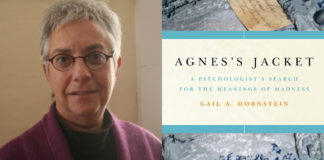Tag: madness
Is Madness an Evolved Signal? Justin Garson on Strategy Versus Dysfunction
Philosopher Justin Garson discusses the potential benefit of looking at madness not as disease or defect, but as a designed feature.
Mad by Design: An Ancient Paradigm of Psychiatric Thought
To propose that madness may have a function is not to deny the toll it may exact on people, but to help us understand what problem it is meant to solve.
Overprescribing Madness
Slick salesmanship, dishonest and incompetent medical practice (overlooked by timid regulators) and cultural, commercial, and political drivers now see Australians hooked on a cycle of over-diagnosis and over-medication.
Psycho-Bizarreness Theory: A Rational, Anti-Psychiatric Theory of Madness
Contrary to the traditional view, Psycho-Bizarreness Theory sees madness as a rational coping mechanism which individuals adopt out of expediency.
The Mad Priestess: A Call to Healing
A mad priestess kicks shame and stigma in the teeth, knowing that we can do better. We could be leading the charge for healing—please don’t call it “mental illness” anymore—and take our place as the wounded healers.
First-Person Accounts of Madness and Global Mental Health: An Interview with...
Dr. Gail Hornstein, author of Agnes’s Jacket: A Psychologist’s Search for the Meanings of Madness, discusses the importance of personal narratives and service-user activism in the context of the global mental health movement.
On Being Mad in Public
Even as you are being shown amazing and mystical things and having all sorts of mysteries clarified in your mind, you are also being placed in a position where no one will pay any attention to what you have to say, or if they do, the results of that attention will be negative (such as being locked up). The mysterious and powerful journey you are on is almost invisible to other people.
From “Recovery” to “Transformation and Recovery”
Just “recovering” one’s previous way of functioning is not so likely to work, because usually something wasn’t working prior to the psychosis. It was that which set off the psychosis, and if that isn’t changed, any “recovery” may not be worth much, as the problems, and so the need to transform, will likely still be present.
From Madness to Mastery: Gaining Competence with Altered States
Is madness good for something? If there is something positive about psychosis, then perhaps what we really need is a balanced view, somewhere between “romanticizing” it as being all good and “awfulizing” it as being all bad.
Why Did I Go Mad?
An upcoming episode of BBC's Horizon will follow three people who live with voices, paranoia, and hallucinations and explore various psychological, biological, social, and environmental...
Why I Don’t Like the Idea that Mental Disorder is a...
What we need to try and understand extreme and unusual states of being are not the specialised methods of natural science. In contrast, it is the ways in which we understand ordinary, everyday behaviour that can help to reveal the nature and meaning of madness.
Madness and Wisdom
This IAI TV video explores the subject of madness, posing the question: might madness be a strange form of wisdom?
The Bughouse: the Poetry, Politics, and Madness of Ezra Pound
From The Guardian: Daniel Swift's book The Bughouse renders a poignant account of poet Ezra Pound's years spent in a psychiatric institution.
Article →
How Psychiatry Almost Stopped Burning Man: A Story of Hell and...
As Burning Man nears its 30th anniversary, USA Today has published an article attempting to explain how this still somewhat freakish event came into existence. I enjoyed the article, but as someone involved in the origin story it tells, I believe that an important piece is being left out. This relates to how misguided “mental health treatment” came close to disabling a key organizer of the early Burning Man. This piece is a fascinating tale in itself, but more fascinating when considered as just one example of how a flawed approach to mental health treatment forms a barrier to many forms of cultural evolution and renewal, with oppressive consequences for society as a whole.
Not Seen
I am The Invisible Woman. A woman with a nice enough bag, a calm demeanor, and well-put-together clothes (they are not “odd,” they attract no attention). You might see me walking my dog near where I live, smiling at my neighbors, making small talk. People make all sorts of comments to me about the crazies. It never occurs to them that I might be among this so-called population.
Getting Back to Dialogue – The Core of Healing!
When people are “mad,” they are often insisting that certain things are so, and frequently seem unwilling or incapable of appreciating or learning from other perspectives. Yet when the supposedly “sane” mental health system approaches those who are mad, it typically does the same thing – it insists that its own view of what’s going on is correct, and seems incapable of appreciating or learning from others, whether they be the patient, the family, former users of services, or anyone who understands madness in a different way.
Madness and the Family: What Helps, and What Makes Things...
Families are often very important for people encountering severe mental and emotional difficulties. But how can family members really know what is helpful, and what is likely to make things worse for the person having problems? Similarly, for those who want to help families, how can they know what will really be helpful for those families, and what will make things worse?
“Lucy of ‘Peanuts’: The Best-Known Psychiatrist of the 20th Century?”
Susan Perry of MinnPost reviews “a charming essay” entitled “The Madness of Charlie Brown” that appeared in The Lancet. “Written by British psychiatrist Dr. Athar Yawar, the essay provides gentle and tongue-planted-firmly-in-cheek psychological profiles of the major characters in “Peanuts,” one of the most popular comic strips of all time.”
“The Rise of Mad Studies”
Mad Studies is emerging as a new academic discipline in Canada and proponents are challenging popular conceptions of “madness” and the medicalization human experiences.
Listening for the Person within “Madness”
As we struggle to invent a humane approach to the extreme states that get called “psychosis” or “madness” or “schizophrenia,” it may be helpful to investigate some of the better approaches developed in the past. While these approaches are not without their flaws, they are often surprisingly insightful. (It can also of course be depressing to notice how truths once more widely known were so easily “forgotten” as compassionate approaches got ditched in favor of the latest coercive innovations.)
Finding the Gifts Within Madness
When people are seeing the world really different than we do, it’s often reassuring to think that there must be something wrong with them – because if they are completely wrong, or ill, then we don’t have to rethink our own sense of reality, we can instead be confident about that own understandings encompass all that we need to know. But it can be disorienting and damaging to others to have their experiences defined as “completely wrong” or “ill.” And we ourselves become more ignorant when we are too sure that there is no value in other ways of looking or experiencing.
Going Deeper into “Madness”: ISPS 2015’s International Dialogue
As awareness spreads about there being something wrong with existing approaches to “psychosis” aka “madness.” Interest grows in exploring what to do instead. One meeting place for exploring this question of “what to do” will be the ISPS conference in NYC in March 2015, which is titled “An International Dialogue on Relationship and Experience in Psychosis.” This conference promises to stand out in terms of the variety of voices, perspectives, approaches and traditions that it will bring together to focus on the deeper issue of how helpers can best understand and interact with those experiencing what is called psychosis.
Why “Stabilizing” People is Entirely the Wrong Idea
If human beings were meant to be entirely stable entities, then “stabilizing” them would be an entirely good thing; a target for mental health treatment that all could agree on. But it’s way more complex than that: healthy humans are constantly moving and changing. They have a complex mix of stability and instability that is hard to pin down. All this relates to one of my favorite subjects, the intersection of creativity and madness.
Madness and Play: Exploring the Boundary
When children do things like recoil in fear from monsters and ghosts in their darkened bedroom at night, it’s easy to see the “out of touch with reality” aspect of their experience as being closely related to the faculty that gives them their ability to play – their imagination. We help children through such challenging experiences by being with them, and by playing together, doing things like creating scary images together and then figuring out how to cope with them or laugh at them. In the process we help them explore how to create a world view that works to at least some extent and has room for joy and originality - when their imagination helps them (and maybe others) see the world in new ways.
Could a Different Approach to “Mental Health” Be Part of Solving...
Earth Day 2013 is a good time to reflect on how problems in our mental health system reflect deep flaws in “normal” conceptions of what it means to be a human being. These flawed conceptions then contribute in a critical way to the climate crisis that threatens us all.























